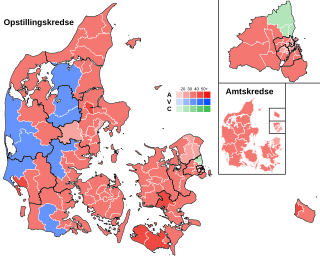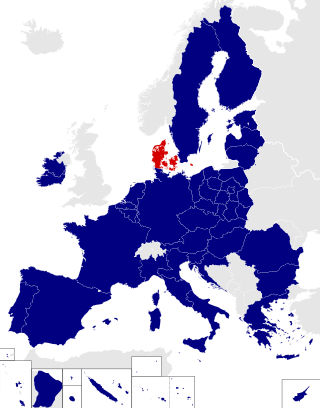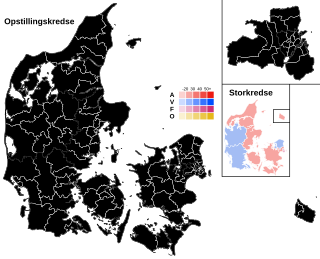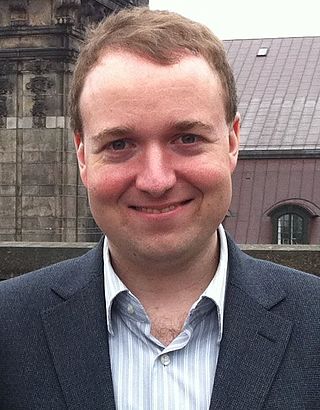| ||
16 seats in the European Parliament | ||
|---|---|---|
European Parliament elections were held in Denmark between 7 and 10 June 1979 to elect the 15 Danish members of the European Parliament. Elections were held separately in Greenland to elect one Greenlandic member.
| ||
16 seats in the European Parliament | ||
|---|---|---|
European Parliament elections were held in Denmark between 7 and 10 June 1979 to elect the 15 Danish members of the European Parliament. Elections were held separately in Greenland to elect one Greenlandic member.
| Party | Votes | % | Seats | |
|---|---|---|---|---|
| Social Democrats | 382,487 | 21.92 | 3 | |
| People's Movement against the EEC | 365,760 | 20.96 | 4 | |
| Venstre | 252,767 | 14.48 | 3 | |
| Conservative People's Party | 245,309 | 14.06 | 2 | |
| Centre Democrats | 107,790 | 6.18 | 1 | |
| Progress Party | 100,702 | 5.77 | 1 | |
| Socialist People's Party | 81,991 | 4.70 | 1 | |
| Left Socialists | 60,964 | 3.49 | 0 | |
| Justice Party of Denmark | 59,379 | 3.40 | 0 | |
| Danish Social Liberal Party | 56,944 | 3.26 | 0 | |
| Christian People's Party | 30,985 | 1.78 | 0 | |
| Total | 1,745,078 | 100.00 | 15 | |
| Valid votes | 1,745,078 | 97.96 | ||
| Invalid/blank votes | 36,426 | 2.04 | ||
| Total votes | 1,781,504 | 100.00 | ||
| Registered voters/turnout | 3,725,235 | 47.82 | ||
| Source: Folketingsårbog | ||||
| Main apportionment | ||||
|---|---|---|---|---|
| Letter | Electoral alliance/party outside of electoral alliance | Votes | Quotients | Seats |
| A | Social Democrats | 382,487 | 3.82 | 3 |
| B | Danish Social Liberal Party | 56,944 | 0.57 | 0 |
| CMQV | Conservative People's Party/Centre Democrats/Christian People's Party/Venstre | 636,851 | 6.37 | 6 |
| EFNY | Justice Party/Socialist People's Party/People's Movement against the EEC/Left Socialists | 568,094 | 5.68 | 5 |
| Z | Progress Party | 100,702 | 1.01 | 1 |
| Divisor: 100,000 | ||||
| Alliance 1 | ||||
|---|---|---|---|---|
| Letter | Party | Votes | Quotients | Seats |
| C | Conservative People's Party | 245,309 | 2.96 | 2 |
| M | Centre Democrats | 107,790 | 1.30 | 1 |
| Q | Christian People's Party | 30,985 | 0.37 | 0 |
| V | Venstre | 252,767 | 3.05 | 3 |
| Divisor: 83,000 | ||||
| Alliance 2 | ||||
|---|---|---|---|---|
| Letter | Party | Votes | Quotients | Seats |
| E | Justice Party | 59,379 | 0.74 | 0 |
| F | Socialist People's Party | 81,991 | 1.02 | 1 |
| N | People's Movement against the EEC | 365,760 | 4.57 | 4 |
| Y | Left Socialists | 60,964 | 0.76 | 0 |
| Divisor: 80,000 | ||||

A member of the European Parliament (MEP) is a person who has been elected to serve as a popular representative in the European Parliament.
The June Movement was a Danish left Eurosceptic political organisation founded 23 August 1992. It took its name from the referendum on the Maastricht Treaty that took place in Denmark in June of that year. The movement was a member of the European political party EUDemocrats - Alliance for a Europe of Democracies.

The Løgting is the unicameral parliament of the Faroe Islands, an autonomous territory within the Danish Realm.

The Inatsisartut, also known as the Parliament of Greenland in English, is the unicameral parliament of Greenland, an autonomous territory in the Danish Realm. Established in 1979, it meets in Inatsisartut, on the islet of Nuuk Center in central Nuuk.

European Parliament elections were held in Denmark on 13 June 2004 to elect the 14 Danish members of the European Parliament. The opposition Social Democrats made major gains, mainly at the expense of Eurosceptic parties such as the June Movement.

There are three types of elections in Denmark: elections to the national parliament, local elections, and elections to the European Parliament. Referendums may also be called to consult the Danish citizens directly on an issue of national concern.

General elections were held in Denmark on 8 February 2005. Prime Minister Anders Fogh Rasmussen's Venstre remained the largest party in the Folketing and his governing coalition with the Conservative People's Party remained intact, with the Danish People's Party providing the parliamentary support needed for the minority government. The Danish Social Liberal Party made the biggest gains of any party, although it remained outside the governing group of parties. The elections marked the second time in a row that the Social Democrats were not the largest party in parliament, a change from most of the 20th century. The Social Democrats lost five seats and leader Mogens Lykketoft resigned immediately after the elections. Voter turnout was 85% in Denmark proper, 73% in the Faroe Islands and 59% in Greenland.

Bendt Bendtsen is a Danish politician who served as Member of the European Parliament (MEP) from 2009 until 2019. He was the leader of the Conservative People's Party from 1999 to 2008, and served as Minister of Economic and Business Affairs. As a MEP, he was part of the European People's Party.
Gitte Seeberg is a Danish politician, lawyer, and current secretary general of the Danish branch of the WWF. She was a member of the Danish Folketinget parliament for the Conservative People's Party and New Alliance, and has previously been a Member of the European Parliament.

The 1989 European Parliament election was a held on June Wednesday 15 to Sunday 18 across the 12 European Union member state in June 1989. It was the third European Parliament election but the first time that Spain and Portugal voted at the same time as the other members they joined in 1986. Overall turnout dropped to 59%.

The 1979 European Parliament election was a series of parliamentary elections held across all 9 European Community member states. They were the first European elections to be held, allowing citizens to elect 410 MEPs to the European Parliament, and also the first international election in history.

European Parliament elections were held in Denmark on 10 June 1999 to elect the 16 Danish members of the European Parliament.

Denmark is a European Parliament constituency for the elections to the European Parliament covering the Member state of the European Union Denmark, but not other parts of the Danish Realm such as the Faroe Islands or Greenland, which are not a part of the EU. It is currently represented by fifteen Members of the European Parliament. Denmark uses the D'Hondt method of proportional representation. Electoral alliances between two or more parties are allowed.

European Parliament elections were held in Denmark on 14 June 1984 to elect the 15 Danish members of the European Parliament. Elections were held separately in Greenland to elect one Greenlandic member.

European Parliament elections were held in Denmark on 15 June 1989 to elect the 16 Danish members of the European Parliament.

European Parliament elections were held in Denmark on 9 June 1994 to elect the 16 Danish members of the European Parliament.

European Parliament elections were held in Denmark on 7 June 2009 to elect the 13 Danish members of the European Parliament. The election was held simultaneously with a referendum on changing the Danish Act of Succession.

Greenland was a European Parliament constituency for elections in the European Union covering the territory of Greenland. It seceded from the European Community in 1985. It was represented by one Member of the European Parliament.

Michael Aastrup Jensen is a Danish politician, who is a member of the Folketing for the Venstre political party. He was elected into parliament at the 2005 Danish general election.

The 2019 European Parliament election in Denmark was held on 26 May 2019, and elected the Danish members to the European Parliament. The elections are part of the EU-wide elections for the parliament. Denmark had 13 seats in parliament, which increased by one additional seat following Brexit.